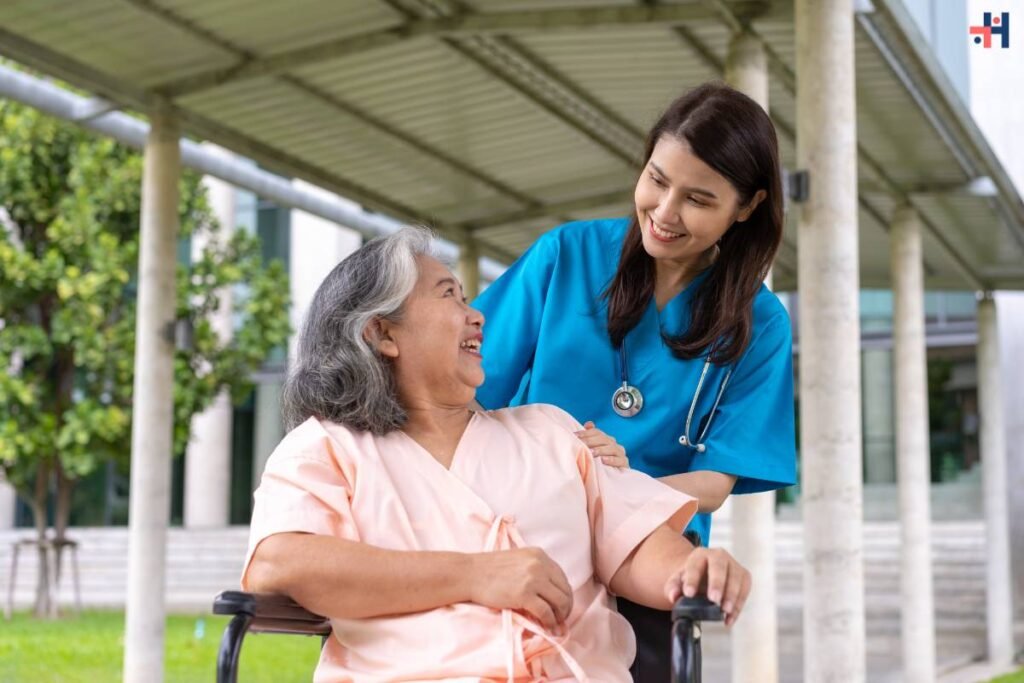The need of giving our loved ones competent and sensitive care increases as they get older. Since homes provide a comfortable and familiar atmosphere, many families decide to care for their ageing family members there. We will examine the main factors, difficulties, and approaches related to giving senior care at home in this thorough guide. We will examine the different facets that go into providing a dignified and holistic approach to care for the elderly at home, from establishing a safe living environment to attending to medical needs and fostering mental well-being.
The Decision to Care for the Elderly at Home
1. Understanding the Benefits: A Familiar and Supportive Environment
Choosing to care for the elderly at home provides numerous benefits, the foremost being the familiarity and comfort of their own living space. This familiarity can contribute to emotional well-being, minimizing the stress and disorientation often associated with transitioning to unfamiliar environments such as assisted living facilities.
2. Promoting Independence: Maintaining Autonomy in Daily Life
Caring for the elderly at home allows for the preservation of independence in daily activities. Encouraging autonomy, even in simple tasks, contributes to a sense of purpose and self-worth. Creating an environment that supports independence while offering assistance when needed fosters a positive and empowering caregiving dynamic.
1. Creating a Safe and Supportive Living Space

1. Home Modifications: Ensuring Accessibility and Safety
Adapting the home environment to cater to the unique needs of elderly individuals is crucial. This may include installing handrails, ramps, and grab bars, ensuring that the living space is wheelchair accessible if necessary. Removing potential hazards and creating a clutter-free environment minimizes the risk of falls.
2. Comfortable and Functional Spaces: Tailoring Living Areas to Needs
Designing living spaces that are comfortable and functional is essential for the well-being of elderly individuals. Considerations include ergonomic furniture, well-lit areas, and easy access to frequently used items. Tailoring spaces to accommodate specific needs, such as a bedroom on the ground floor for those with mobility challenges, enhances overall comfort.
2. Addressing Medical Needs
1. Regular Health Assessments: Proactive Monitoring of Well-Being
Regular health assessments are a cornerstone of caring for the elderly at home. Monitoring vital signs, tracking medications, and scheduling routine check-ups help identify potential health issues early on. Proactive healthcare management contributes to better overall well-being and can prevent the escalation of medical concerns.
2. Medication Management: Ensuring Adherence and Safety

Managing medications is a critical aspect of elder care. Establishing a system for medication organization, dispensing, and adherence is essential. This may involve the use of pill organizers, medication reminders, and communication with healthcare professionals to streamline the medication regimen.
3. Assistance with Activities of Daily Living (ADLs): Providing Support as Needed
Assistance with Activities of Daily Living (ADLs), such as bathing, dressing, grooming, and meal preparation, may be required as individuals age. Providing respectful and personalized support in these areas ensures that the elderly maintain a sense of dignity and comfort in their daily routines.
3. Emotional Well-Being and Social Connection
1. Companionship and Social Interaction: Combating Loneliness
Loneliness and social isolation are common challenges for the elderly. Integrating companionship into daily routines, whether through family visits, social activities, or caregiver engagement, is essential for emotional well-being. Connecting with local senior centers, community groups, or arranging regular social outings can combat feelings of isolation.
2. Engaging in Hobbies and Activities: Nurturing Mental Stimulation
Encouraging elderly individuals to engage in hobbies and activities they enjoy contributes to mental stimulation and overall well-being. This may include reading, gardening, crafting, or participating in community events. Providing opportunities for continued learning and intellectual engagement fosters a sense of purpose and fulfillment.
4. Caregiver Support and Self-Care
1. Training and Education for Caregivers: Empowering with Knowledge
Caregivers play a pivotal role in providing care for the elderly at home. Offering training and education on topics such as medical care, safety protocols, and communication strategies equips caregivers with the knowledge and skills needed for effective and compassionate caregiving.
2. Respite Care: Ensuring Caregiver Well-Being
Caring for an elderly family member can be emotionally and physically demanding. Implementing respite care arrangements, where temporary relief is provided by another caregiver or support service, ensures that primary caregivers have the opportunity for self-care, rest, and rejuvenation.
5. Financial Considerations and Support Services

1. Financial Planning: Navigating Elder Care Costs
Care for the elderly at home comes with financial considerations. Developing a comprehensive financial plan that includes potential healthcare costs, home modifications, and additional caregiving expenses is crucial. Exploring available financial assistance programs and benefits can help alleviate the financial burden associated with elder care.
2. Utilizing Support Services: Accessing Professional Assistance
Leveraging support services is essential for holistic elder care. This may include hiring home health aides, enlisting the assistance of physical or occupational therapists, or utilizing meal delivery services. Professional support services can enhance the quality of care provided and address specific medical or caregiving needs.
6. End-of-Life Planning and Emotional Support
1. Advanced Care Planning: Facilitating Open Discussions
While it may be a sensitive topic, discussing end-of-life preferences and decisions is crucial for comprehensive elder care. Facilitating open and honest discussions about advanced care planning, including preferences for medical interventions and end-of-life arrangements, ensures that the elderly individual’s wishes are respected.
2. Emotional Support for Caregivers and Family: A Vital Component
Emotional support is vital for both the elderly individuals and their caregivers. Establishing open lines of communication, fostering a supportive family network, and seeking emotional support through counseling or support groups contribute to the overall well-being of everyone involved in the caregiving journey.
Conclusion:
Providing in-home care for the elderly is an immensely fulfilling but complex duty that necessitates careful evaluation of numerous aspects. Comprehensive elder care necessitates a deliberate and proactive strategy, encompassing everything from establishing a secure and nurturing living environment to attending to medical requirements, fostering mental health, and making future plans. Families can cultivate an atmosphere of love, respect, and dignity by accepting the opportunities and challenges that come with taking care for the elderly at home. This will enable their loved ones to age with grace and the assistance they require.









